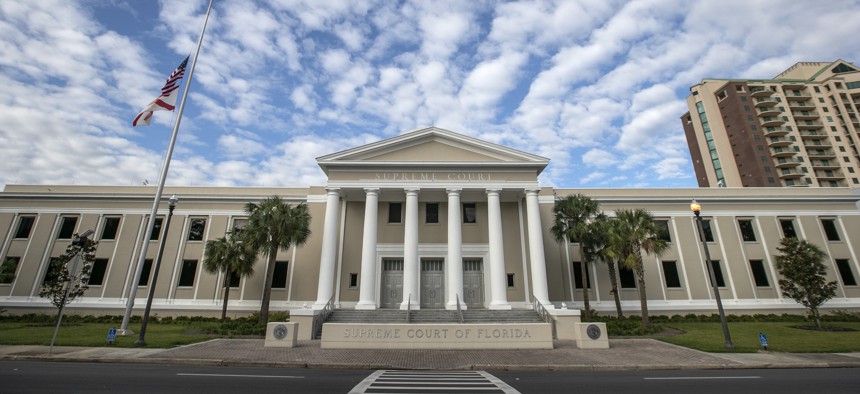State Courts From Oregon to Georgia Will Now Decide Who—If Anyone—Can Get an Abortion

The Florida Supreme Court building is pictured on November 10, 2018 in Tallahassee, Florida. Mark Wallheiser/Getty Images
COMMENTARY | There's likely to be a flood of litigation as people try to invalidate state laws on abortion.
The U.S. Supreme Court’s denial of abortion rights under the federal constitution is leading pro-choice advocates to seek other legal pathways to protect reproductive rights.
Just one week after the court’s June 24, 2022, ruling on Dobbs v. Jackson Women’s Health Organization, there’s a flurry of litigation in state courts.
New lawsuits in Idaho, Utah, Kentucky and Florida all assert that state constitutions protect the right to get an abortion.
A Florida judge temporarily blocked the state’s ban on abortions after 15 weeks on June 30. Leon County Judge John Cooper said that the Florida ban, set to take effect on July 1, violated the state constitution’s privacy provision, which guaranteed that, “Every natural person has the right to be let alone and free from governmental intrusion into the person’s private life.”
This and other similar state court cases demonstrate the rising importance of state constitutions, which often protect citizens’ right to privacy more explicitly than the U.S. Constitution.
Since the Supreme Court overturned Roe v. Wade and Planned Parenthood v. Casey, state laws, rather than federal law, will now determine whether someone can legally get an abortion. It also means that state Supreme Courts will become much more important in deciding the validity of state laws on abortion.
The U.S. Supreme Court ruled in Dobbs v. Jackson Women’s Health Organization on June 24 that there is no constitutional right to abortion.
“The Constitution does not confer a right to abortion; Roe and Casey are overruled; and the authority to regulate abortion is returned to the people and their elected representatives,” Justice Samuel Alito wrote in the majority opinion.
Without the federal constraint of the Roe v. Wade precedent, state legislatures will be free to craft their own abortion regulations, subject only to each state constitution.
State supreme courts play a key role in ensuring that state laws are legal, aligned with individual state constitutions. But their key role is often overshadowed by public attention on major federal courts – especially the U.S. Supreme Court.
As a scholar of constitutional law, I believe that the overruling of Roe v. Wade is a chance to better understand the important role state supreme courts play in determining individual rights, including abortion rights.
Now that the court has overturned Roe v. Wade, there’s likely to be a flood of litigation in the state courts, as people try to invalidate state laws on abortion.

The power of state supreme courts
Supreme Court Justice Samuel Alito’s leaked draft opinion on abortion in May 2022 focused public attention on the importance of state legislation regulating or banning abortion.
The laser focus on state legislation, however, neglects how abortion rights will now be decided at the state level – not in statehouses, but in state courts. This is because state courts have the power to declare state laws unconstitutional if they are inconsistent with state constitutions.
“Abortion presents a profound moral question. The Constitution does not prohibit the citizens of each State from regulating or prohibiting abortion. Roe and Casey arrogated that authority. The Court overrules those decisions and returns that authority to the people and their elected representatives,” Alito wrote in the June 24 opinion.
State supreme court judges are selected in different ways, depending on the state. While judges are directly elected by voters in Georgia, Nevada and Oregon, for example, governors appoint state supreme court judges in states that include Maine and Massachusetts. These judges can serve anywhere from six years to no fixed term, aside from expected retirement at the age of 70.
My own research indicates that elected state judges tend to find state laws unconstitutional more often than appointed state judges do. Nevertheless, in the context of abortion, elected court judges have to answer to their constituencies. In conservative states, that means they may be more hesitant to invalidate restrictive abortion laws under their state constitutions.

Variation in protection
State constitutions vary considerably in how they protect people’s individual rights, like freedom of speech or the right to privacy. One element of privacy rights is the right to get an abortion – as the Supreme Court inferred when it upheld abortion in 1973 and linked the two issues.
Often, state constitutions protect individual rights that are not included in the federal constitution. Privacy rights, for example, are not mentioned in the U.S. Constitution but are spelled out in a number of state constitutions.
Many state courts can look to state constitutions that more explicitly reference privacy or that include other provisions that protect rights in ways not paralleled in the U.S. Constitution.
At present, only 10 state supreme courts, including those in Massachusetts, Kansas and California, have determined that their constitutions protect the right to get an abortion. But it is likely that this issue will be presented to more state supreme courts following the demise of Roe.
State abortion laws
Some state supreme court decisions protecting a right to abortion have generated backlash. In 2019, for example, the Kansas Supreme Court ruled that a person’s decision to end a pregnancy is legally protected under the state constitution.
Anti-abortion groups are now trying to undo this precedent and amend the constitution to allow for new laws that would restrict abortion. Kansas residents will vote on this issue in August 2022.
Two other state legislatures – Tennessee and West Virginia – passed similar constitutional amendments in 2014 and 2018 to invalidate previous state court decisions that protected abortion rights.
With the demise of Roe, there will be more pressure to introduce new state constitutional amendments that would invalidate state court decisions on abortion.

The way forward
There will also be more pressure on state supreme courts.
The Iowa state supreme court, for example, reversed its own 2018 ruling on June 17, 2022, deciding that the state constitution does not protect abortion rights.
Florida’s state supreme court is also considering whether it should uphold the state’s recently enacted ban on abortion after 14 weeks of pregnancy.
As U.S. Appeals Court Judge Jeffrey Sutton has observed, state and federal constitutions “give surprisingly different answers” to many issues involving individual rights, including abortion.
State-level litigation, as well as legislation, will shape reproductive rights now that Roe is eliminated.
![]()
Stefanie Lindquist, Foundation Professor of Law and Political Science, Arizona State University
This article is republished from The Conversation under a Creative Commons license. Read the original article.
Stefanie Lindquist is a professor of law and political science at Arizona State University.
NEXT STORY: $750M Headed to States For New Gun Control Initiatives





